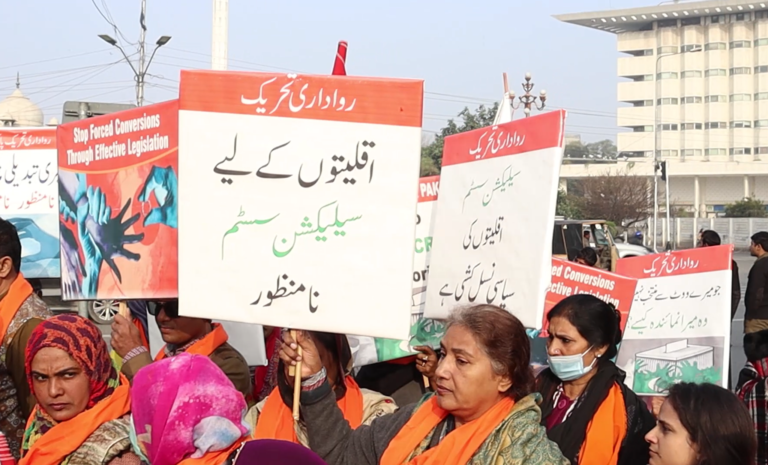
More than 300 activists attended a protest in front of the Punjab Assembly in Lahore on Friday to demand a fair process to fill up reserved seats for minorities in the parliament.
The protest, organised by Rwadari Tehreek, sought a change in the current system for representing minorities in the provincial and national assemblies. The protesters carrying banners and placards chanted slogans against the deprivation of their political rights and demanded urgent reforms to ensure their democratic rights.
Religious minorities claim that previous governments also tended to undercount them because it allowed the government to draw smaller constituencies and apportion fewer seats in the assemblies and the Senate.
Currently, religious minorities may contest on only 33 reserved seats in the assemblies and four seats in the Senate. Ten seats have been reserved for minorities in the National Assembly.
According to the Constitution, the entire country is a constituency for these reserved seats. This means that no specific quota for any geographic area or federating unit has been set and political parties are free to nominate their candidates from any area.
These seats are filled through the method of proportional representation. Minority seats are allocated to parties according to the proportion of general seats they have bagged in the elections. The party winning less than five percent of the general seats does not get any quota of reserved seats.
Similarly, all provincial assemblies also have reserved seats for minorities. At present, the total number of reserved seats on which members of provincial assemblies will be elected in the 2023 General Elections is 23.
“A large number of minority voters is unhappy, dissatisfied and have reservations about this system. Power remains with the political parties and the ruling elite with no regard for merit,” said Samson Salamat, chairman of the Rwadari Tehreek.
“As a result, the parliamentarians on minority seats follow their party lines rather than the minority issues. While continuing the current system of joint electorates, electoral reforms are needed to empower minority voters.”